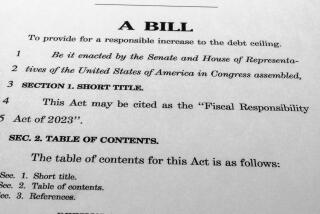House sends farm bill compromise to the Senate

- Share via
WASHINGTON -- The House of Representatives easily approved a new five-year farm bill Wednesday, ending nearly two years of contentious debate over how to cut agriculture subsidies and nutrition programs.
The final vote was 251-166. The Senate is expected to begin considering the compromise bill, which was unveiled Monday by House and Senate negotiators, early next week.
The final product averts deep cuts sought by Republicans in the federal food stamp program and ends direct payments to farmers — a controversial provision under the previous farm bill in which farmers received federal subsidies regardless of their output.
Conservatives had stymied efforts to pass a farm bill in the House last year, arguing in part that agriculture subsidy programs should be considered separately from food stamps provided under the Supplemental Nutrition Assistance Program. Some also called for a controversial work requirement to be included for food stamp recipients, a proposal that helped unite Democrats against the plan.
In a final speech urging his colleagues to support the measure, House Agriculture Committee Chairman Frank D. Lucas (R-Okla.) said the final result sends a positive message to the American people at a time when most are fed up with dysfunction in the capital.
“This bill … may not have exactly everything my friends on the right would want, or my friends on the left would want,” he said. “It represents making the process work. Achieving consensus. Putting into place policies that are better than what were there before.”
He also acknowledged the difficult path it had taken to reauthorize the 2008 farm bill.
“This farm bill might not be quite defined by most people as a miracle,’’ he said. “But it’s amazingly close.”
The $956-billion bill extends through 2018. Sponsors, citing a Congressional Budget Office estimate, said the legislation reduces the deficit by $23 billion, based on the difference between new spending levels and those that would have been in place by extending the previous farm bill.
More than $18 billion of the savings comes from farm programs, while $8 billion is provided by cuts to the food stamp program. Some Democrats still opposed the bill, calling the food stamp cuts too deep.
“Some have rationalized these cuts,” Rep. Jim McGovern (D-Mass.) said during the floor debate. “Some have tried to explain them away as nothing but closing loopholes. They are wrong. People are going to be hurt.”
Still, 89 Democrats supported the measure, joining 162 Republicans to help send the measure to the Senate. Of the 166 “no” votes, 103 were from Democrats and 63 from Republicans, largely reflecting the objections of each party’s base.
Follow Politics Now on Twitter and Facebook
Twitter: @mikememoli
More to Read
Sign up for Essential California
The most important California stories and recommendations in your inbox every morning.
You may occasionally receive promotional content from the Los Angeles Times.











